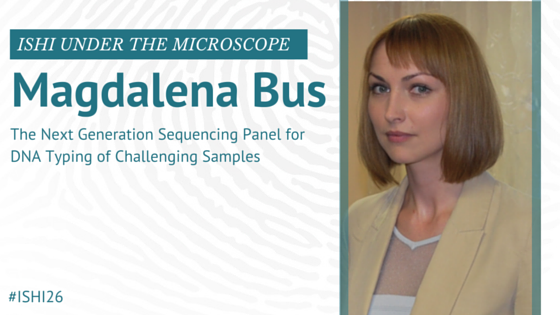The ISHI 26 agenda is already filling up with some great talks from amazing speakers! While the forensic community is a tight-knit group, we can always get a little closer, right? With that in mind, we asked our speakers some questions to get to know them a little better outside of their work. We’ll be posting their responses over the coming months in a feature we like to call Under the Microscope.
Today, we’re chatting with Magdalena Bus, who will be presenting The Next Generation Sequencing Panel for DNA Typing of Challenging Samples during the General Sessions.
Magdalena Bus is a researcher in the Department of Immunology, Genetics, and Pathology, Uppsala University, Uppsala Biomedical Centre (BMC), forensic research group. She received her Ph.D. in Agricultural Sciences with a specialization in animal genetics from the Faculty of Biology and Animal Breeding, University of Life Science, Lublin, Poland in 2009.
She is experienced in working with human and animal samples collected noninvasively in the field, museum specimens, forensic samples, and ancient DNA. At present, her research is focused mainly on the development of highly sensitive and discriminating assays for forensic DNA analysis of challenging evidence and ancient DNA samples. Touch DNA and samples immersed in water fascinate her most. Her research has resulted in solving several cases, including a cold case where a limited amount of severely degraded DNA was available. Additionally, she works with DNA extracted from human remains from the Vasa warship that have been in seawater for over 300 years and ancient samples from excavations of Viking-age boat graves. In free time, she sings in the Stockholm Police Choir.
How did you come to work in the field of forensics/DNA?
Working with severely degraded and low copy number DNA has always fascinated me. I have been working with challenging DNA for over 10 years. I have been lucky to work with DNA extracted from several different types of biological materials collected non-invasively in the field, and museum specimens. The next stage was the analyses of human ancient DNA. I have always wanted to help people and apply my knowledge and experience into a field of high importance for society. This became possible when I moved to Sweden three years ago and I started to work in forensic science.
If you woke up tomorrow and this field no longer existed, what would you choose for a career?
I would definitely become a surgeon.
What new technologies are you most excited about or where do you see the field heading in the next 10 years?
I hope that it will be possible to establish robust methodology and standard guidelines for next generation sequencing involving few copies of DNA as an input.
What was the most challenging or bizarre case that you’ve worked on?
One of the most difficult and at the same time fascinating cases was analysis of DNA extracted from fingerprints that had been immersed in water for over ten years.
What person would you say has had the biggest influence in your life?
My grandmother and the biology teacher from primary school had the biggest influence on my life. Thanks to both of them, I am in science today.
Can you think of a specific example where ISHI has helped you in your career or with a case?
Not yet, but I think that the meeting is a great opportunity for future collaborations and for exchanging knowledge and experience.
Who in the audience would benefit most from your talk?
Forensic scientists performing human identification on DNA extracted from degraded samples and those especially interested in developing next generation sequencing for forensic applications.
If you won the lottery, what would you do with the winnings?
I would give most of it to my family and friends. I would save the rest just in case.
If you were to have a theme song, what would it be?
Frank Sinatra – My way
What would your ideal vacation be?
Some time with my family and friends, without thinking about deadlines, and without connection to the Internet and telephones.
WOULD YOU LIKE TO SEE MORE ARTICLES LIKE THIS? SUBSCRIBE TO THE ISHI BLOG BELOW!


